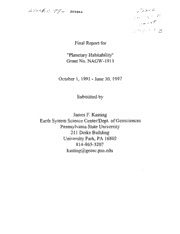
NASA Technical Reports Server (NTRS) 19980010660: Planetary Habitability PDF
Preview NASA Technical Reports Server (NTRS) 19980010660: Planetary Habitability
/;"/J..'J/u?_-y--.- zo5844 Final Report for "Planetary Habitability" Grant No. NAGW- 1911 October 1, 1991 - June 30, 1997 Submitted by James F. Kasting Earth System Science Center/Dept. of Geosciences Pennsylvania State University 211 Deike Building University Park, PA 16802 814-865-3207 [email protected] FINAL REPORT FOR NASA GRANT NAGW-1911 James F. Kasting, PI This grant was entitled "Planetary Habitability" and the work performed under it related to elucidating the conditions that lead to habitable, i.e. Earth-like, planets. Below are listed publications for the past two and a half years that came out of this work. The main thrusts of the research involved: 1) showing under what conditions atmospheric 02 and 03 can be considered as evidence for life on a planet's surface, 2) determing whether CH4 may have played a role in warming early Mars, 3) studying the effect of varying UV levels on Earth-like planets around different types of stars to see whether this would pose a threat to habitability, and 4) studying the effect of chaotic obliquity variations on planetary climates and determining whether planets that experienced such variations might still be habitable. Several of these topics involve ongoing research that has been carried out under a new grant number, but which continues to be funded by NASA's Exobiology program. Publications resulting from Grant NAGW-1911 Kasting, J.F. Oz concentrations in dense primitive atmospheres: commentary, Planet. Space Sci. 43, 11-13, 1995. Kasting, J.F. Fit for life: climate stability on Earth and the implications for life elsewhere, Science Spectra, issue 2, pp. 32-36, 1995. Kasting, J.F. Habitable zones around stars: an update, in Circumstellar Habitable Zones, L.R. Doyle, ed., Travis House Publications, Menlo Park, CA, pp. 17-28, 1996. Williams, D.M., J.F. Kasting, and K. Caldeira. Chaotic obliquity variations and planetary habitability, in Circumstellar Habitable Zones, L.R. Doyle, ed., Travis House Publications, Menlo Park, CA, pp. 43-62, 1996. Kasting, J.F. Planetary atmosphere evolution: Do other habitable planets exist and can we detect them? Astrophys. Space Sci. 241, 3-24. Reprinted in: The Search for Extra- Solar Terrestrial Planets: Techniques and Technology, J. M Shull, H.A. Thronson, and S.A. Stem, eds., Kluwer Academic Publishers, Dordrecht (1997), pp. 3-24, 1996. Williams, D.M., J.F. Kasting, and RA. Wade. Habitable moons around extrasolar giant planets, Nature 385,234-236, 1997. Kasting, J.F. Environmental constraints on the origin of life, Commentarii 4, N. 3, pp. 133- 147, Pontifical Academy of Sciences, Rome. Reprinted in: Encyclopedia Italiana (in press), 1997. Kasting, J.F. Habitable zones around low mass stars and the search for extraterrestrial life, Origins of Life 27, 291-307, 1997. Kasting, .I.F. Warming early Earth and Mars (Perspective), Science 276, 1213-1215, 1997. Kasting, J.F., D.C.B. Whittet, and W.R. Sheldon. Ultraviolet radiation from F and K stars and implications for planetary habitability, Origins of Life 27, 413-420, 1997.
